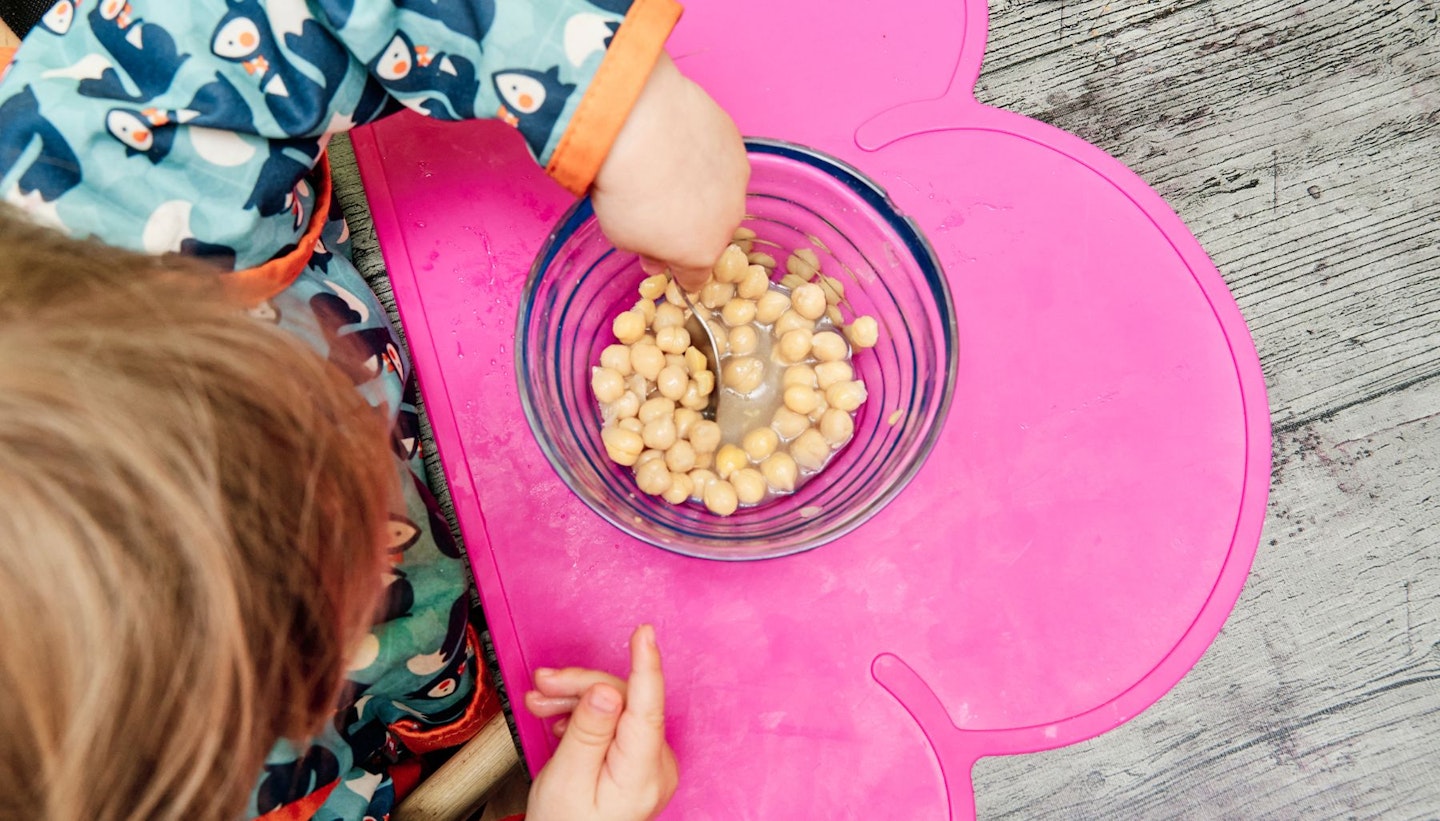Winter is coming, and with it, all the joys of chilly days, cosy nights—and the not-so-welcome winter bugs! As parents, we know all too well how quickly those sniffles and coughs can sneak up on our little ones. So, how can you keep your baby healthy this season?
Before you stock up on comfort foods, let's talk about something just as comforting: building your baby's immune system with the right foods. With The Eco Midwife, Angie Willis (in partnership with MAM), Charlotte Stirling-Reed, baby and child nutritionist, and Dr Carrie Ruxton, a dietitian and health writer, we've gathered expert tips on the best winter superfoods to help your baby stay strong and well.
Did you know that winter brings a rise in hospital visits for respiratory syncytial virus among infants? According to the NHS, nine in 10 children will have RSV by the time they’re two, making it essential to load up on nutrient-dense foods that can help your baby fight off winter illnesses.
So, what should you be putting on your baby's plate? We've got you covered with expert-approved baby winter foods that will keep your baby nourished, happy, and ready to take on the colder months!

1. Stock up on fruits
Forest fruits and mixed berries
Berries are naturally sweet and packed with goodness, making them a hit with babies.
"These colourful fruits are packed with nutrients to help your baby get through a cold winter," says Charlotte. "And they include high numbers of antioxidants as well as plenty of vitamin C to boost your baby's immune system and help ward off any illnesses."
“Berries are a great antioxidant and whilst out of season, frozen berries can be added to make crumbles, pies, smoothies or defrosted and added to healthy home-made snacks,” Angie recommends.
Citrus fruits
Don’t underestimate the power of oranges and other citrus fruits. Dr Carrie emphasises the importance of vitamin C during the winter months. “Vitamin C is the big one for winter immunity,” she says, recommending that you add more fruits and veggies into the diet. “Berries, oranges, red peppers and broccoli are all great sources.
Try stewed fruit on custard or yoghurt if your little one struggles with whole fruit. For children who can handle bits of fruit and veg, offer them a picky platter of chopped banana, peeled apple slices and kiwi while they’re having a little screen time – it will quickly disappear!,” Dr Carrie says.
2. Nutritious vegetables
Sweet potato
A favourite for many babies, sweet potatoes are a delicious and nutritious choice.
“Not only is this a delicious food and a favourite for many babies, but it is also high in vitamin A, vitamin C, and fiber, making them the perfect winter fuel for your baby,” explains Charlotte. Add them to dinners such as soup or offer cooked sweet potato as a finger food to encourage self-feeding.
Kale
Yes, kale is not just for adults! “It contains iron, vitamin A, and vitamin C, all of which are essential for good immune function,” says Charlotte.
Butternut squash and carrots
These colourful veggies are high in vitamin A and can easily be blended into purees or cut into soft, manageable pieces for baby-led weaning. You can roast, steam, or mash them—whatever works for your little one!
“Butternut squash and carrots are high in vitamin A which also contributes towards improved immunity. These can be added to purees, mashed or softened for baby led weaning for babies to hold and eat,” says Angie.
Avocado
“Avocados contain high amounts of unsaturated fatty acids (healthy fats), alongside antioxidants which help protect cells and support a healthy immune response. Avocados are soft and easy to digest, making them a good option for babies," says Edward Mather, registered nutritionist at Fuel Hub.
3. Protein sources
Organic turkey
Planning to share your festive meals with your baby? Turkey is a great protein source for little ones. “It’s a great time to get your little one to try meat if you are weaning around this time,” advises Charlotte. Cut it into tiny pieces for easy handling and to keep those energy levels up!
Lentils
For vegetarian families, lentils are a fantastic way for your baby to get iron. “If you’re bringing up your baby as a vegetarian, lentils are a really great way for him to have his fill of iron,” Charlotte notes. Mix lentils into a puree to give your baby a nutrient boost without them even noticing!
4. Other essential foods
Sprouts
Love them or hate them, sprouts are inexpensive and widely available during winter. “Sprouts have a very distinct taste, but it is always a good idea to offer your baby a variety of tastes and flavors from a young age,” Charlotte reminds us. Even if they turn their nose up at sprouts initially, keep offering them every now and then.
Calcium-fortified foods
Edward says, "Vitamin D and calcium are two nutrients which play critical roles in a baby's growth and development. Vitamin D is primarily obtained through dermal syntheses (sunlight exposure), and as there is a lack of sunlight during winter months, this increases the risk of Vitamin D deficiency.
A deficiency would mean impaired calcium absorption, and given calcium's role in bone health, it is very important babies obtain enough through the diet. Foods high in vitamin D and calcium include dairy products (cheese, yoghurt etc.) and calcium-fortified foods.”
Oily fish and eggs
Dr Carrie recommends introducing eggs, rich in vitamin D, as well as oily fish like salmon. “From six months, introduce eggs by offering lightly scrambled eggs with milk,” she suggests. “Lion eggs are the safest and can be eaten runny.” Try mixing flakes of poached salmon with mashed potatoes to ease your baby into the flavour.
“Oily fish, eggs, red meat, fortified cereals and margarine spreads are high in vitamin D and are a great way to add vitamin D to any meals,” says Angie. She adds, “Garlic and ginger are great to boost immunity, help with flavouring of foods and can be added to a range of meals.”

Foods to avoid for babies under one year
According to Angie, honey should be avoided under one year due to the risk of botulism. Be mindful that many restaurants add honey to roasted vegetables.
She also warns, “Whole nuts are a choking hazard for under-fives, but they’re safe in ground form or as smooth nut butters.”
Dr Carrie recommends being cautious with stews, especially when adding salt. “Keep the pieces of meat small and avoid adding salt. Minced lamb or beef is a good alternative,” she says. "For children under four, stick to milk over orange juice to protect their bones and teeth.”
Edward also cautions, "Foods high in salt and sugar should be avoided as this can cause strain on the baby’s kidneys, as well as inflicting problems like tooth decay. It can also open a gateway for babies to develop unhealthy habits which may carry over into later years. Examples of foods to avoid, especially before the age of one, include sweets and processed foods like crisps.”
The winter vitamin your baby can’t go without
Vitamin D is crucial during the winter months when sunshine is limited.
“Vitamin D is essential for all babies,” stresses Angie. “It’s present in breastmilk, but levels may be low if maternal vitamin D is insufficient. Vitamin D drops are cheap, easy to administer, and recommended for breastfed babies or those consuming less than 500ml of formula per day.”
Dr. Carrie echoes this advice: “Formula-fed babies get enough vitamin D from fortified formula, but breastfed babies and those starting solids need daily vitamin D drops.”
Practical tips for introducing nutrient-dense foods
For fussy eaters, perseverance is key! Introducing new foods to babies is an adventure. Repetition and variety can help them get used to different textures and flavours.
Angie suggests using garlic and ginger to add flavour. She also recommends making multivitamin veggie cubes: “I batch cook a blend of vegetables like carrots, broccoli, spinach, and butternut squash, then freeze them in ice cube trays. I can easily add a cube to any meal without my baby noticing the vegetables.”
Another fun idea is renaming foods. Angie shares, “My eldest refuses most vegetables, but she loves my ‘unicorn soup,’ which is just a vegetable soup with carrots, parsnips, and squash!”
Edward suggests, "To blend veggies into sauces (spinach in pasta sauce or cauliflower in mashed potatoes), and another can be to introduce one new food at a time, pairing them alongside familiar favourites which reduces overwhelm. This can aid the baby to develop a liking for it.”
Every baby is different, so don’t be afraid to experiment in the kitchen. Repetition is key—even if your baby isn’t a fan of a certain food at first, keep offering it. Grab those sweet potatoes, kale, and berries, and make this winter a healthy, delicious season for your little one!
About the experts
Charlotte Stirling-Reed is “The Baby & Child Nutritionist” and is a Registered Nutritionist with the Association for Nutrition. Charlotte is also an author and mum to little foodies Raffy and Adaline, and owner of consultancy, SR Nutrition. It’s her mission in her work to give parents confidence in feeding their children.
Dr Carrie Ruxton is a dietitian, academic and health writer who loves to make nutrition science accessible and fun for everyone. She’s passionate about getting more people to eat a healthy, balanced diet as part of their daily busy lives.
Angie Willis has been a Midwife for eight years and has worked across different areas supporting women in those years. She's also a Health Visitor and has undertaken training n maternal mental health and aromatherapy.
Edward Matheris a registered nutritionist at Fuel Hub. He is equally committed to empowering the public with crucial general knowledge on their health, including women, new mums, and their babies. He understands the unique nutritional needs during these life stages and provides personalised guidance to support them.
About the author
Anne Lora Scagliusi is a Senior Digital Writer at Mother & Baby. She is a Scotland-based journalist with over a decade of international writing experience, specialising in women’s health, maternal mental health, and wellness. Her work has been featured in Vanity Fair, Marie Claire, and Glamour and has appeared on several Vogue global editions. She is mum to a one-year-old bambino and lives between Italy and the UK. You can follow her on Instagram.
